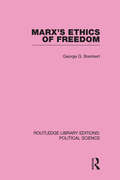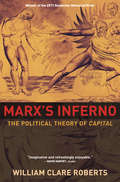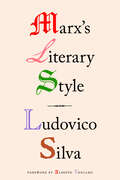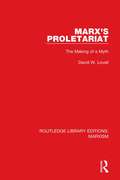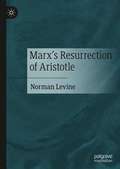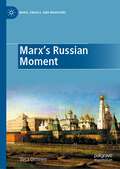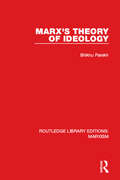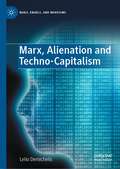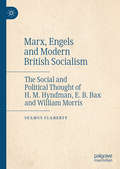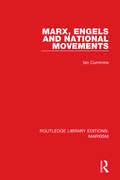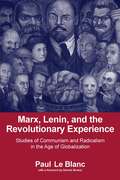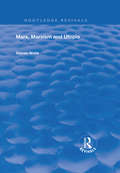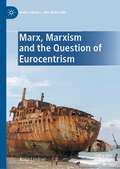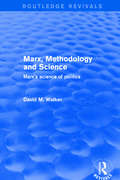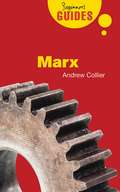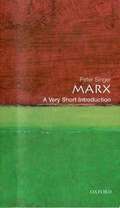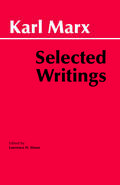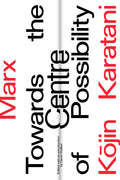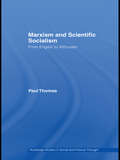- Table View
- List View
Marx's Ethics of Freedom (Routledge Library Editions: Political Science #49)
by George G BrenkertThis book reveals Marx’s moral philosophy and analyzes its nature. The author shows that there is an underlying system of ethics which runs the length and breadth of Marx’s thought. The book begins by discussing the methodological side of Marx’s ethics showing how Marx’s criticism of conventional morality and his views on historical materialism, determinism and ideology are compatible with having an ideological system of his own. In the light of contemporary social, moral and political philosophy the insights and defects of Marx’s major ethical themes are discussed.
Marx's Inferno: The Political Theory of Capital
by William Clare RobertsMarx’s Inferno reconstructs the major arguments of Karl Marx’s Capital and inaugurates a completely new reading of a seminal classic. Rather than simply a critique of classical political economy, William Roberts argues that Capital was primarily a careful engagement with the motives and aims of the workers’ movement. Understood in this light, Capital emerges as a profound work of political theory. Placing Marx against the background of nineteenth-century socialism, Roberts shows how Capital was ingeniously modeled on Dante’s Inferno, and how Marx, playing the role of Virgil for the proletariat, introduced partisans of workers’ emancipation to the secret depths of the modern “social Hell.” In this manner, Marx revised republican ideas of freedom in response to the rise of capitalism.Combining research on Marx’s interlocutors, textual scholarship, and forays into recent debates, Roberts traces the continuities linking Marx’s theory of capitalism to the tradition of republican political thought. He immerses the reader in socialist debates about the nature of commerce, the experience of labor, the power of bosses and managers, and the possibilities of political organization. Roberts rescues those debates from the past, and shows how they speak to ever-renewed concerns about political life in today’s world.
Marx's Literary Style
by Ludovico SilvaMarx&’s Literary Style argues that a true understanding of Marx&’s work requires a careful study of his literary choicesIn Marx&’s Literary Style, the Venezuelan poet and philosopher Ludovico Silva argues that much of the confusion around Marx&’s work results from a failure to understand his literary mode of expression. Through meticulous readings of key passages in Marx&’s oeuvre, Silva isolates the key elements of his style: his search for an &“architectonic&” unity at the level of the text, his capacity to express himself dialectically at the level of the sentence, and, above all, his great gift for metaphor. Silva&’s unique sensitivity to Marx&’s literary choices allows him to illuminate a number of terms that have been persistently, and fatefully, misunderstood by many of Marx&’s most influential readers, including alienation, reflection, and base and superstructure. At the heart of Silva&’s book is his contention that we we cannot hope to understand Marx if we treat him as a scientist, a philosopher, or a literary writer, when he was in fact all three at once.Originally published in 1971, this is a key work by one of the most important Latin American Marxists of the twentieth century. This edition, which marks the first appearance of one of Silva&’s works in English, features an introduction by Alberto Toscano.
Marx's Proletariat: The Making of a Myth (Routledge Library Editions: Marxism #21)
by David W. LovellGeorge Orwell wrote in Nineteen Eighty Four that ‘If there is hope, it lies in the proles.’ A century earlier Marx was unequivocal: the future belonged to the proletariat. Today such confidence might seem misplaced. The proletariat has not yet fulfilled Marx’s expectations, and seems unlikely ever to do so. How could Marx have entertained the notion that the proletariat would emancipate humanity from capitalism and from class rule itself? This book, first published in 1988, attempts an explanation by examining the sources and development of Marx’s concept of the proletariat. It contends that this was not only a crucial element in Marx’s theory but a significant departure in socialist thought. By examining this concept in detail the book uncovers a major contradiction in Marxian thought: although the proletariat is assigned a momentous task it is chiefly depicted as the class of suffering which is why, historically, it has preferred security to enterprise.
Marx's Resurrection of Aristotle
by Norman LevineThis book seeks to show how Karl Marx’s vision of communism was a continuation of Aristotle’s classical humanist philosophy. Challenging the Engelsian distortion of Marx, it presents a negation of previous interpretations of Marx which present him in materialist terms. Engels proposed a picture of the highest stage of communist society as an economic egalitarianism, a vision which became an axiom of Leninist-Stalinist-Soviet Communism. By contrast, here it is shown that Marx embraced the Aristotelian concept of “distributive justice”, of proportionate equality. Spanning the works of Marx, from his university education and doctoral dissertation on the differences between the Democritean and Epicurean philosophy of the atom, to the study of his Rheinische Zeitung period and the persistence of classical humanism in Marx’s defense of the freedom of the press, Levine skillfully reveals the gravitational pull between Marx and Aristotle.Showing how classical humanism is the dominant ethos in the communism of Marx, the book includes chapters on:Hegel as a transition point between Aristotle and MarxThe links between Marx’s theory of labor and Aristotle’s idea of the constitutive subject located in The Politics How the local methodologies of Aristotle and Hegel provided Marx with the social methodologies by which to interpret the functioning of capitalismMarx's Resurrection of Aristotle is the culmination of Norman Levine's life-long work to establish the correct placement of Marx and Marx’s communism within the classical humanist tradition.
Marx's Russian Moment (Marx, Engels, and Marxisms)
by Vesa OittinenThis book discusses Marx’s relations with Russia, which have always been ambivalent. In his youth, and indeed a good way into the 1860s, Marx might even be called a “Russophobe.” Around 1870, however, his views on Russia undergo a change; he becomes acquainted with a new kind of Russian radical and revolutionary movement and begins to study Russian. It becomes clear that Marx begins to feel that Russia is some kind of a “touchstone” for his theories. Offering a new and original interpretation of Marx’s theoretical development, Marx’s Russian Moment analyzes the following themes: Marx’s concept of ideology (as developed in the German Ideology) and its fortunes in Russia; Marx’s encounter with Bakunin and Russian nihilism; Marx’s and Engels’s studies of primitive societies; Engels’s views of the developmental perspectives of small Slavic nations; and Marx’s views on Finland, the Russian Grand Duchy. Considering these topics as “case studies,” Oittinen argues that Marx’s encounter with Russia substantially influenced Marx’s (and Engels’s) views not just on current political and economic matters but also on a philosophical and methodological level.
Marx's Theory of Ideology (Routledge Library Editions: Marxism #22)
by Bhikhu ParekhAlthough Marx’s concept of ideology has been a subject of considerable discussion, much of the debate has proved to be rather disappointing. There has been no systematic attempt to examine why Marx needed the concept of ideology, why it was an important concept for him and how it related to his views on truth and objectivity. This book, first published in 1982, considers these and other neglected questions. It explains why Marx continued to use the term ideology throughout his life to mean both idealism and apologia and traces the complex ways in which, according to Marx, such talented writers as Hegel became apologists. In conclusion the book outlines the lessons Marx learnt from his investigations into the nature and mechanism of ideology and discusses his theories of objectivity and truth.
Marx, Alienation and Techno-Capitalism (Marx, Engels, and Marxisms)
by Lelio DemichelisIn this book, translated into English for the first time, Lelio Demichelis takes on a modern perspective of the concept/process of alienation. This concept—much more profound and widespread today than first described and denounced by Marx—has largely been forgotten and erased. Using the characters of Narcissus, Pygmalion and Prometheus, the author reinterprets and updates Marx, Nietzsche, Anders, Foucault and, in particular, critical theory and the Frankfurt School views on an administered society (where everything is automated and engineered, manifest today in algorithms, AI, machine learning and social networking) showing that, in a world where old and new forms of alienation come together, man is increasingly led to delegate (i.e. alienate) sovereignty, freedom, responsibility and the awareness of being alive.
Marx, Engels and Modern British Socialism: The Social and Political Thought of H. M. Hyndman, E. B. Bax and William Morris
by Seamus FlahertyThis book is a reception study of Karl Marx’s and Friedrich Engels’ ideas in Britain during the late nineteenth century and a revisionist account of the emergence of modern British socialism. It reconstructs how H. M. Hyndman, E. B. Bax, and William Morris interacted with Marx and ‘Marxism’. It shows how Hyndman was a socialist of liberal and republican provenance, rather than the Tory radical he is typically held to be; how Bax was a sophisticated thinker and highly influential figure in European socialist circles, rather than a negligible pedant; and it shows how Morris’s debt to Bax and liberalism has not been given its due. It demonstrates how John Stuart Mill, in particular, was combined with Marx in Britain; it illuminates other liberal influences which help to explain the sectarian attitude adopted by the Social Democratic Federation towards organised labour; and it establishes an alternative genealogy for Fabian socialism.
Marx, Engels and National Movements (Routledge Library Editions: Marxism Ser. #12)
by Ian CumminsWhile their attempts to understand the workings of capitalism led them to the conclusion that the advanced societies of Western Europe were those most likely to be the setting for a successful socialist revolution, Marx and Engels by no means ignored developments outside this region. Indeed, given the configurations of international politics in their time, plus their conception of capitalism as a universalising system, they believed that some of the forces working for change in less advanced regions could even affect the prospects of a proletarian revolution in Western Europe itself. This book, first published in 1980, traces the development of Marx and Engels’ attitudes towards, and relations with, the principal national movements of their time. It deals with their responses to such movements in areas as diverse as Ireland and India, Poland and China, and Russia and the United States, as well as in many other regions. Many of Max and Engels’ most significant statements on the national question were made in their journalism, occasional addresses and private correspondence – sources not always readily accessible to, or even known by, some of their more immediate successors. Subsequent publication of this previously-dispersed material has enabled a more coherent picture of their ideas on the subject to be drawn. Marx and Engels believed that national aspirations and the cause of socialism did not always go hand in hand and each national struggle had to be examined on its merits and judged according to whether its success would retard or enhance the prospects of a socialist revolution. Based on a wide range of sources, this study examines an important, yet neglected, area of Marx and Engels’ ideas and activities, and indicates the criteria by which they determined their attitudes at different times to a variety of national movements at work in four continents.
Marx, Lenin and the Science of Revolution
by Max F. EastmanA critique of the science of Marxism by the American journalist and philosopher Max Eastman.
Marx, Lenin, and the Revolutionary Experience: Studies of Communism and Radicalism in an Age of Globalization
by Paul LeBlancMarx, Lenin, and the Revolutionary Experience offers a fresh look at Communism, both the bad and good, and also touches on anarchism, Christian theory, conservatism, liberalism, Marxism, and more, to argue for the enduring relevance of Karl Marx, and V.I. Lenin as democratic revolutionaries. It examines the "Red Decade" of the 1930s and the civil rights movement and the New Left of the 1960s in the United States as well. Studying the past to grapple with issues of war and terrorism, exploitation, hunger, ecological crisis, and trends toward deadening "de-spiritualization", the book shows how the revolutionaries of the past are still relevant to today's struggles. It offers a clearly written and carefully reasoned thematic discussion of globalization, Marxism, Christianity (and religion in general), Communism, the history of the USSR and US radical and social movements.
Marx, Marxism and Utopia
by Darren WebbThis title was first published in 2000: This engaging book suggests that Marx was right to reject 'utopian socialism' on the grounds that it undermined the principles of proletarian self-emancipation and self-determination. As a theoretician of the proletarian class, Marx sought to capture the spirit of revolution in a manner which precluded the need for utopian philanthropy and the messianic elitism which invariably accompanied it. In a powerful and original central argument, the book suggests that the categories which together define Marx’s own 'utopia' were nothing more than theoretical by-products of the models employed by Marx in order to supersede the need for utopianism. As such, Marx was an 'accidental' utopian. Rather than legitimating utopianism, however, the author argues that this conclusion reinforces the need to develop Marx’s anti-utopian project further. Emphasising the contemporary relevance of Marx’s original critique, the conclusion suggests that the future of socialism lies in its ability to harness, not the spirit of utopia, but the spirit of adventure.
Marx, Marxism and the Question of Eurocentrism (Marx, Engels, and Marxisms)
by Kolja LindnerThis book mediates between postcolonial positions that criticize Marxist approaches (and Marx’s writings) for their Eurocentrism and defenders of Marx, who claim that this accusation is a myth. In different contributions to this volume, Kolja Lindner pleads for a differentiated assessment of the whole of Marx’s work, including less known manuscripts, and a theoretical reconstruction of various elements that have come into the focus of postcolonial critique: ethnocentrism, Orientalism, false universalism and the oblivion of modernity’s global entanglement. Against this background, two opportunities simultaneously arise: Marx’s Eurocentrism can be deconstructed and his growing awareness of global developments and cosmopolitan struggles established.
Marx, Methodology and Science: Marx's Science of Politics
by David M. WalkerThis title was first published in 2001. The book aims to give a clear and accessible account of Marx’s method and an assessment of its scientific validity and relevance to contemporary social science; The key methodological themes of Marx’s work and their development are shown with particular attention paid to the elements of dialectics and materialism; Four models of science are outlined-positivism; critical rationalism; scientific conventionalism; scientific realism - and the arguments and evidence both for and against Marx’s method corresponding to any of them examined. The conclusion arrived at is that Marx’s method is a good example of social scientific practice according to the scientific realist model and that it has a positive contribution to make to social science today.realism.
Marx, Spinoza and Darwin: Materialism, Subjectivity and Critique of Religion (Marx, Engels, and Marxisms)
by Mauricio Vieira MartinsMarx, Spinoza and Darwin presents a common thread in its argument: it shows how these authors—certainly with differences among themselves—consolidated a field of investigation that does not resort to transcendent or religious premises in approaching the phenomena they analyze. Thus, when Spinoza declared that the “will of God” is the “sanctuary of ignorance,” when Marx provocatively maintained that “criticism of religion is the premise of all criticism,” or when Darwin polemicized against a millennial creationist approach, all were taking a stand that invited us to view our world through a secular and immanent lens. In addition to this common thread, Martins discusses other issues present in the works of these thinkers, for instance the space that exists for human subjectivity from a Marxist perspective (which is not to be confused with philosophical “objectivism”): men and women are encouraged to act in the world. With this conceptual background, the concluding chapters of the book address the proliferation of some less examined Christian fundamentalisms in contemporary world, presenting an explanatory hypothesis for the phenomenon.
Marx: A Beginner's Guide (Beginner's Guides)
by Andrew CollierBreathing new life into the achievements of Karl Marx, this accessible and jargon-free introduction is a timely reminder of his undiminished influence. Andrew Collier's engaging text not only introduces the reader to Marx the revolutionary, but also redefines him as one of the first truly democratic thinkers. In a concise yet searching manner, Collier covers all the elements of marxist thought, from the early writings to such major texts as 'Capital' and the key themes of labour and society. Punctuating his study with a wide range of examples, from Aristotelian thought to Thatcherite policy, he explores the traditional notion of Marx the activist, while probing the apparent inconsistencies in his work and reclaiming his place as a philosopher and political theorist. Concluding with a thought-provoking assessment of Marx's pervasive influence on the political landscape of the twenty-first century. Collier's study highlights our own global inequalities and will be warmly welcomed by students, scholars and activists from a variety of backgrounds.
Marx: A Very Short Introduction
by Peter SingerMarx wrote at such enormous length, on so many different subjects, that it is not easy to see his ideas as a whole. I believe that there is a central idea, a vision of the world, which unifies all of Marx's thought and explains what would otherwise be puzzling features of it. In this book I try to say, in terms comprehensible to those with little or no previous knowledge of Marx's writings, what this central vision is.
Marx: Bullet Guides
by Robert AndersonOpen this book and you will: - learn about Marx's life - know his key works - deal with dialectic - assess his influence
Marx: Bullet Guides
by Robert AndersonOpen this book and you will: - learn about Marx's life - know his key works - deal with dialectic - assess his influence
Marx: Early Political Writings
by Karl Marx Richard A. Davis Joseph O'MalleyThe political doctrine of Karl Marx is to be found in a broad range of both published and unpublished writings. This volume, the first of two which together span his entire output, presents his early texts of 1843–7, which predate the Communist Manifesto. excerpts from the Critique of Hegel's Philosophy of Right and from the Paris Notebooks, Points on the State and Bourgeois Society and other writings are newly translated and arranged in a sequence that illuminates the development of Marx's thought, while the introduction discusses the intellectual context of the theories he constructed. A chronology of Marx's life and career and an annotated bibliography complete a volume which will be an invaluable guide to the formation of one of the most influential doctrines in the history of political thought.
Marx: Later Political Writings
by Karl Marx Terrell CarverMarx: Later Political Writings brings together the most important texts in political philosophy written by Marx after 1848. All are in new translations, and the collection is introduced by the leading Marx scholar Terrell Carver. Unlike other collections, the works are presented complete, according to their earliest edition or manuscript text, and include the Manifesto of the Communist Party, and the little-known Notes on Adolph Wagner. These texts allow the close contact between Marx and contemporary politics to emerge in a clearer light.
Marx: Selected Writings (Hackett Classics)
by Karl Marx Lawrence H. SimonFeaturing the most important and enduring works from Marx's enormous corpus, this collection ranges from the Hegelian idealism of his youth to the mature socialism of his later works. Organized both topically and in rough chronological order, the selections (many of them in the translations of Loyd D. Easton and Kurt H. Guddat) include writings on historical materialism, excerpts from Capital, and political works.
Marx: Towards the Centre of Possibility
by Kojin KarataniClassic study of Marx by Japan's leading critical theoristOriginally published in 1974, Kojin Karatani's Marx: Towards the Centre of Possibility has been amongst his most enduring and pioneering works in critical theory. Written at a time when the political sequences of the New Left had collapsed into crisis and violence, with widespread political exhaustion for the competing sectarian visions of Marxism from 1968, Karatani's Marx laid the groundwork for a new reading, unfamiliar to the existing Marxist discourse in Japan at the time. Karatani's Marx takes on insights from semiotics, deconstruction, and the reading of Marx as a literary thinker, treating Capital as an intervention in philosophy that could be read as itself a theory of signs. Marx is unique in this sense, not only because of its importance in post-68 Japanese thought, but also because the heterodox reading of Marx that Karatani debuts in this text, centered on his theory of the value-form, will go on to form the basis of his globally-influential work.
Marxism & Scientific Socialism: From Engels to Althusser (Routledge Studies in Social and Political Thought)
by Paul ThomasEngels declared at Marx’s funeral in Highgate Cemetery that "just as Darwin discovered the law of development of organic nature, so Marx discovered the law of development of human history". Scientific socialism was the term Engels used to describe Marx's socio-economic philosophy and many later theorists sought to reinforce Marxist theory with a supposedly scientific basis. This book explains the development of the idea of scientific socialism through the 19th and 20th century from its origins in Engels to its last manifestation in the work of Althusser. It provides a detailed analysis of Engel's own conceptualisation, the impact of Darwin, the relationship to the 'official' historical materialism of the Soviet states and later reformulations by Althusser and others. In so doing it provides a vivid intellectual history of Marxist and socialist thought, exploring its significant insights as well its manifest failures. Marxism and Scientific Socialism will be of particular interest to those with an interest in the development of Marxism and socialism, political ideologies and the history of Western political thought.
